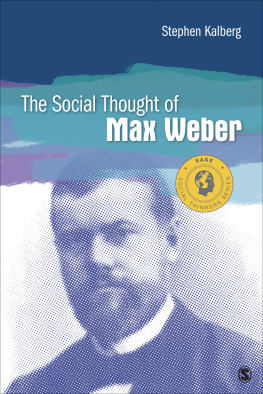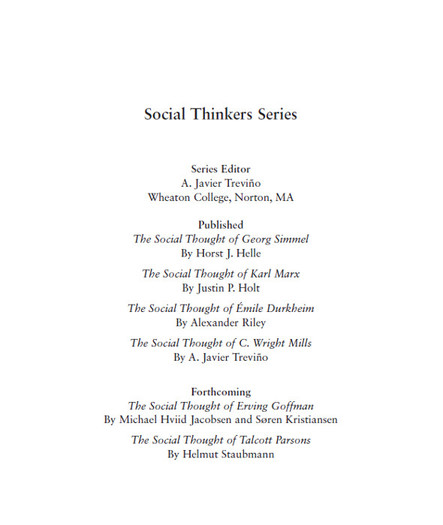FOR INFORMATION:
SAGE Publications, Inc.
2455 Teller Road
Thousand Oaks, California 91320
E-mail: order@sagepub.com
SAGE Publications Ltd.
1 Olivers Yard
55 City Road
London EC1Y 1SP
United Kingdom
SAGE Publications India Pvt. Ltd.
B 1/I 1 Mohan Cooperative Industrial Area
Mathura Road, New Delhi 110 044
India
SAGE Publications Asia-Pacific Pte. Ltd.
3 Church Street
#10-04 Samsung Hub
Singapore 049483
Copyright 2015 by SAGE Publications, Inc.
All rights reserved. No part of this book may be reproduced or utilized in any form or by any means, electronic or mechanical, including photocopying, recording, or by any information storage and retrieval system, without permission in writing from the publisher.
Printed in the United States of America.
Library of Congress Cataloging-in-Publication Data
Holt, Justin P.
The social thought of Karl Marx / Justin P. Holt, The Gallatin School of New York University.
pages cm.(Social thinkers series)
Includes bibliographical references and index.
ISBN 978-1-4129-9784-3 (pbk. : alk. paper)
1. Marxian economics. 2. Marxian school of sociology. 3. Marx, Karl, 18181883Political and social views. I. Title.
HB97.5.H5774 2015
335.41dc23 2014006295
14 15 16 17 18 10 9 8 7 6 5 4 3 2 1
Acquisitions Editor: Jeff Lasser
Editorial Assistant: Nick Pachelli
Production Editor: David C. Felts
Copy Editor: Kim Husband
Typesetter: C&M Digitals (P) Ltd.
Proofreader: Victoria Reed-Castro
Indexer: Karen Wiley
Cover Designer: Gail Buschman
Marketing Manager: Erica DeLuca
Series Editors Foreword
The SAGE Social Thinkers series is dedicated to making available compact, reader-friendly paperbacks that examine the thought of major figures from within and beyond sociology. The books in this series provide concise introductions to the work, life, and influences of the most prominent social thinkers. Written in accessible and provocative prose, these books are designed for advanced undergraduate and graduate students of sociology, politics, economics, and social philosophy, as well as for scholars and socially curious general readers.
The first few volumes in the series are devoted to the classical thinkersKarl Marx, mile Durkheim, Max Weber, Georg Simmel, George Hebert Mead, Talcott Parsons, and C. Wright Millswho, through their seminal writings, laid the foundation for much of current social thought. Subsequent books will feature more contemporary scholars as well as those not yet adequately represented in the canon: Jane Addams, Charlotte Perkins Gilman, Harold Garfinkel, Norbert Elias, Jean Baudrillard, and Pierre Bourdieu. Particular attention is paid to those aspects of the social thinkers personal background and intellectual influences that most impacted his or her approach in better understanding individuals and society.
Consistent with SAGEs distinguished track record of publishing high-quality textbooks in sociology, the carefully assembled volumes in the Social Thinkers series are authored by respected scholars committed to disseminating the disciplines rich heritage of social thought and to helping students comprehend key concepts. The information offered in these books will be invaluable for making sense of the complexities of contemporary social life and various issues that have become central concerns of the human condition: inequality, social order, social control, deviance, the social self, rationality, reflexivity, and so on.
These books in the series can be used as self-contained volumes or in conjunction with textbooks in sociological theory. Each volume concludes with a Further Readings chapter intended to facilitate additional study and research. As a collection, the Social Thinkers series will stand as a testament to the robustness of contemporary social thought. Our hope is that these books on the great social thinkers will give students a deeper understanding of modern and postmodern Western social thought and encourage them to engage in sociological dialogue.
Premised on Newtons aphorism, If I have seen farther, it is by standing on the shoulders of giants (an aphorism, incidentally, that was introduced into sociology by Robert K. Merton, himself a towering figure in the discipline), the Social Thinkers series aims to place its readers on the shoulders of the giants of 19th- and 20th-century social thought.
Acknowledgments
First and foremost, I would like to thank A. Javier Trevio, the Social Thinkers series editor and the author of the volume on C. Wright Mills. If Javier had not contacted me about writing an introductory book on Marx, I would have never attempted it. But, thankfully, he provided me with the opportunity, and Im glad he did. His comments and criticisms were always helpful and made this book much better than the initial drafts. Im quite happy with the outcome, and I hope he is too. The six readers of a draftBenjamin F. Hadis, Fatmir Haskaj, Alexa Trumpy, Daniel Egan, Kristopher Kohler, and Ernesto Castaedadevoted a considerable amount of time in providing insightful commentary, which made this book clearer and more accessible. I thank them for their commitment and candor. Finally, my beautiful and talented girlfriend, Alise Wallis, has helped me in countless ways over the years. If it wasnt for her intelligence, compassion, and insight, this book would never have been completed.
Introduction
Karl Marxs influence on the social sciences and philosophy has been one of emulation, disgust, horror, and praise. Many students are taught about Marx in an introductory sociology, political science, philosophy, or economics course, but usually they do not learn the complexity of his work. His ideas appear as an influence in many contemporary theories, either as a supporting or detracting basis. In addition, Marx occupies a notable place in the popular imagination as a social analyst and feared revolutionary. As of late (this book was finalized in 2013), Marx has received some renewed interest due to people suffering from the worst economic downturn since the Great Depression of the 1930s. This coverage indicates that people are buying Marxs books again. Shocked by the economic downturn, people are seeking to understand why and how capitalism can fail to grow and maintain employment. In this media coverage of Marx and his ideas, little attention is given to those scholars that attempt to analyze our economic shortcomings with the achievements of Marx and those who have further developed his theories. All this influence, hysteria, and notoriety does not inform us of the actual work that Marx did.
This book is about Marxs work including his philosophy, sociology, economics, and politics. My intention in writing this book is to explain what Marx said and to examine if it still makes any sense. I think that Marxs work has a cogency that can be presented clearly and systematically. What specifically is Marxs work about? Marxs work was an attempt to understand the social processes of capitalism. Capitalism is discussed at greater length in the first chapter. For now, we can simply describe capitalism as a social system with the following features: people are free to sell their labor, they are able to accumulate property as their own, and market transactions are commonplace. Marx became interested in capitalism because he found that these features resulted in misery for the majority of people who live in capitalist societies and societies affected by capitalism. Marx also found this outcome of this book explain the various categories of analysis utilized by Marx and his theoretical and empirical results.















